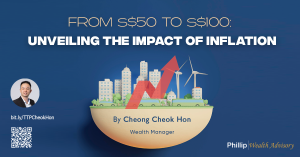Fifty Shades of Ethics June 7, 2023

In Singapore, Financial Advisor refers to the financial institutions such as banks and insurance companies Financial Advisory Representative (FAR) in turn refers to the individual professionals. This post attempts to sort FARs between two extremes of salesmanship and true blue advisers. Let us not forget that there exists as many as 50 shades of grey (if not more) between the extremes. This piece will help you to gain a better understanding of where to place your FAR on the said monochrome gradient.
Background
First, understand that financial advisory is a craft. To fully understand the difference between science and craft within this industry, read on. If you are enlightened, you will realise that the industry is not diagnostic enough, a problem which will remain for a long time to come. Hence, Bolam and Montgomery Principles may not necessarily apply.
As such, the legal requirement is at best a reasonable basis for recommendation. This means that it is possible for a whole life plan to be recommended for the financial objective of children’s education funding. Here, the industry can point out what is wrong by proposing only an insurance term plan for children’s education funding, but cannot pinpoint diagnostically what is the right thing to do.
While I firmly believe that morality (as well as ethics) and legality should converge in the long run, they are, however, different. So let’s dissect the issue.
To add more shades of grey, there are different approaches to ethics. Here are a few:
Friedman Doctrine – A firm should maximise its profits without going beyond social expenditures mandated by law.
Where rules are not explicit or clear, businesses may maximise profit for shareholders.
If shareholders wish to share proceeds to make social investments, that is their right, but managers of the firm should not make that decision for them.
Utilitarian Ethics – Maximisation of good, minimisation of bad.
Choose what is best for the greatest number of people by making use of cost-benefit analysis and risk assessment. However, the cost and risks associated with this approach are difficult to quantify. Besides, it may result in an unjust treatment of a minority when it comes to justice.
Kantian Ethics – Duty to a moral law: An action can only be good if the principle behind it. This is the duty towards moral law. This approach implies that treating humans as if they were cogs in a machine is wrong as no one is a tool, as in Utilitarian ethics, which does not utilise moral emotions and sentiments (context, sympathy and caring).
Rights Theories – Recognising that humans have fundamental rights and privileges that must be “protected” means that a minimum standard of moral behavior must be established.
Justice Theories – All economic goods and services should be distributed equally except when an unequal distribution would work to everyone’s advantage. Inequality is justified if the least advantaged is better off.
Veil of Ignorance is a method of determining the morality of issues. It asks a decision-maker to make a choice about a social or moral issue, and assume that they have enough information to know the consequences of their possible decisions for everyone but would not know, or would not take into account, which person he or she is. According to the theory, not knowing one’s ultimate position in society leads to the creation of a just system because the decision-maker would not want to make decisions that benefit one group at the expense of another as the decision-maker could theoretically end up in either group. Slavery is one of the examples of this, where you would outlaw it because you might end up in the slave group.
The major players in the Financial Advisory (FA) industry include advisory firms, FA representatives, regulators, and, of course, prospects and clients. The interests of these parties are aligned based on the above-mentioned approaches.
Situation
In the context of the Central Provident Fund (CPF), consider the simple act of transferring monies from the Ordinary Account (OA) to Special Account (SA); or even at times after careful analysis, the simple advice of reigning in spending to generate savings first, is the best advice of all. Unless an advisory fee is charged in connection with a recommendation, advisory firms and their FARs are unable to earn anything.
The remuneration structure of the industry is largely commission-based, which does not result in the best alignment of interests.
Furthermore, the regulator has to consider the financially challenged parts of the population and agree that an entirely fees based structure will make financial advisory access prohibitively expensive.
Proposed Solution: The Facilitating Decision Making (FDM) Process
It is suggested that FARs should be allowed to charge a fee to take a prospect through the FDM process, which entails that actual work is done. So, if no implementation of any plans takes place, the representative is not worse off.
The time is probably ripe to push for a higher advisory fee based on the environment for applying the FDM process. This will encourage product manufacturers to develop even better and lower-cost distribution products based on their actuarial births. As a result, the financially challenged have better products as do the Do-It-Yourself online and financially savvy ones who use the FDM. Those who wish for the FDM work to be done can also pay a fee that is justified by the amount of work required.
Contributor:

Isaac Fang
Portfolio Manager (Dual Licence)
Phillip Securities Pte Ltd (A member of PhillipCapital)
http://bit.ly/TTPisaac
Disclaimer
These commentaries are intended for general circulation. It does not have regard to the specific investment objectives, financial situation and particular needs of any person who may receive this document. Accordingly, no warranty whatsoever is given and no liability whatsoever is accepted for any loss arising whether directly or indirectly as a result of any person acting based on this information. Opinions expressed in these commentaries are subject to change without notice. Investments are subject to investment risks including the possible loss of the principal amount invested. The value of the units and the income from them may fall as well as rise. Past performance figures as well as any projection or forecast used in these commentaries are not necessarily indicative of future or likely performance. Phillip Securities Pte Ltd (PSPL), its directors, connected persons or employees may from time to time have an interest in the financial instruments mentioned in these commentaries. Investors may wish to seek advice from a financial adviser before investing. In the event that investors choose not to seek advice from a financial adviser, they should consider whether the investment is suitable for them.
The information contained in these commentaries has been obtained from public sources which PSPL has no reason to believe are unreliable and any analysis, forecasts, projections, expectations and opinions (collectively the “Research”) contained in these commentaries are based on such information and are expressions of belief only. PSPL has not verified this information and no representation or warranty, express or implied, is made that such information or Research is accurate, complete or verified or should be relied upon as such. Any such information or Research contained in these commentaries are subject to change, and PSPL shall not have any responsibility to maintain the information or Research made available or to supply any corrections, updates or releases in connection therewith. In no event will PSPL be liable for any special, indirect, incidental or consequential damages which may be incurred from the use of the information or Research made available, even if it has been advised of the possibility of such damages. The companies and their employees mentioned in these commentaries cannot be held liable for any errors, inaccuracies and/or omissions howsoever caused. Any opinion or advice herein is made on a general basis and is subject to change without notice. The information provided in these commentaries may contain optimistic statements regarding future events or future financial performance of countries, markets or companies. You must make your own financial assessment of the relevance, accuracy and adequacy of the information provided in these commentaries.
Views and any strategies described in these commentaries may not be suitable for all investors. Opinions expressed herein may differ from the opinions expressed by other units of PSPL or its connected persons and associates. Any reference to or discussion of investment products or commodities in these commentaries is purely for illustrative purposes only and must not be construed as a recommendation, an offer or solicitation for the subscription, purchase or sale of the investment products or commodities mentioned.
About the author
Isaac Fang
Portfolio Manager (Dual Licence)
Isaac has been in the financial services industry since 2001. Over the years, he has acquired CFP, ChFC and CFA certifications. Passionate about financial literacy for the masses, he has conducted courses at People’s Association Community Clubs and delivered presentations at SGX events. He has also trained practitioners in the CFP programme and contributed articles to IFPAS’ Tuesday Times.
In recognition of his work, he was awarded Top TR Securities Wrap for 2016 and 2017; Top TR IOP Phillip SING Inc ETF in 2018; and Top Performer Self-Trading Futures in 2019. He was also a finalist in FPAS’ Financial Planning Awards 2020.
Isaac adds value to his clients by adopting a design-driven innovation approach in his financial advisory services.

 From $50 to $100: Unveiling the Impact of Inflation
From $50 to $100: Unveiling the Impact of Inflation  Japan’s Economic Resurgence: Unveiling the Tailwinds Behind Nikkei 225’s Record Leap
Japan’s Economic Resurgence: Unveiling the Tailwinds Behind Nikkei 225’s Record Leap  How to soar higher with Positive Carry!
How to soar higher with Positive Carry!  Why 2024 Offers A Small Window of Opportunity and How to Position Yourself to Capture It
Why 2024 Offers A Small Window of Opportunity and How to Position Yourself to Capture It 









